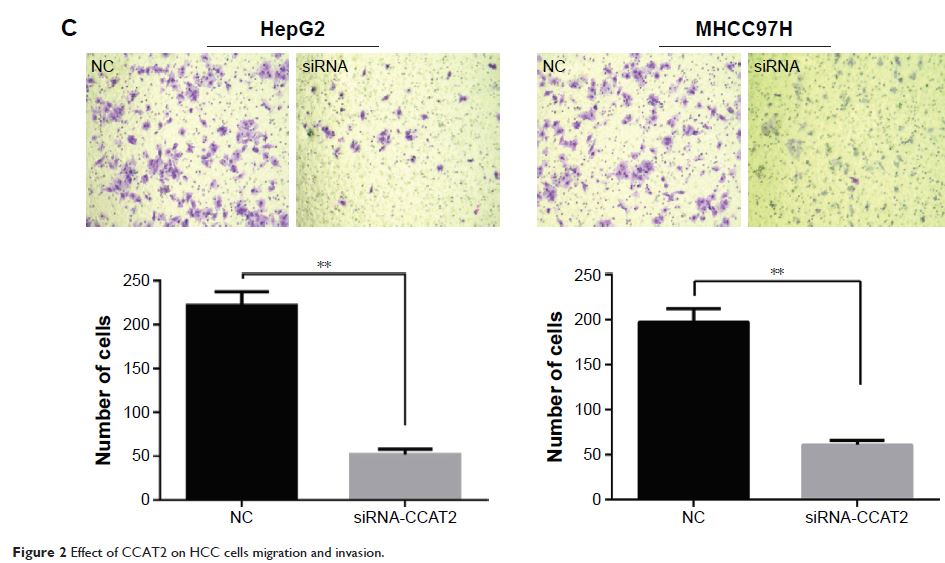109568
论文已发表
注册即可获取德孚的最新动态
IF 收录期刊
- 3.4 Breast Cancer (Dove Med Press)
- 3.2 Clin Epidemiol
- 2.6 Cancer Manag Res
- 2.9 Infect Drug Resist
- 3.7 Clin Interv Aging
- 5.1 Drug Des Dev Ther
- 3.1 Int J Chronic Obstr
- 6.6 Int J Nanomed
- 2.6 Int J Women's Health
- 2.9 Neuropsych Dis Treat
- 2.8 OncoTargets Ther
- 2.0 Patient Prefer Adher
- 2.2 Ther Clin Risk Manag
- 2.5 J Pain Res
- 3.0 Diabet Metab Synd Ob
- 3.2 Psychol Res Behav Ma
- 3.4 Nat Sci Sleep
- 1.8 Pharmgenomics Pers Med
- 2.0 Risk Manag Healthc Policy
- 4.1 J Inflamm Res
- 2.0 Int J Gen Med
- 3.4 J Hepatocell Carcinoma
- 3.0 J Asthma Allergy
- 2.2 Clin Cosmet Investig Dermatol
- 2.4 J Multidiscip Healthc

长非编码 RNA CCAT2 与肝细胞癌的不良预后相关,并通过调节 Snail2 介导的上皮-间质转化来促进肿瘤转移
Authors Xu Y, Wang B, Zhang F, Wang A, Du X, Hu P, Zhu Y, Fang Z
Received 8 November 2016
Accepted for publication 19 January 2017
Published 24 February 2017 Volume 2017:10 Pages 1191—1198
DOI https://doi.org/10.2147/OTT.S127100
Checked for plagiarism Yes
Review by Single-blind
Peer reviewers approved by Dr Colin Mak
Peer reviewer comments 2
Editor who approved publication: Dr Tohru Yamada
Abstract: Increasing evidence has demonstrated that aberrant expressions of long
non-coding RNAs (lncRNAs) are involved in various malignancies, including
hepatocellular carcinoma (HCC). This study aimed to investigate the role of
lncRNA colon cancer-associated transcript 2 (CCAT2) in the progression of
HCC. Quantitative real-time polymerase chain reaction analysis confirmed that
CCAT2 was upregulated in HCC cell lines and cancerous tissues compared with
normal liver cell line and adjacent normal tissue samples. The level of CCAT2
was positively associated with tumor–node–metastasis stages and vessel
invasion. Survival analyses revealed that high CCAT2 expression predicted poor
prognostic outcomes, serving as an independent prognostic factor for HCC
patients. Patients with high CCAT2 expression had a 1.849-fold increased risk
of death compared with those with low CCAT2 expression. Moreover, we also found
that knockdown of CCAT2 expression reduced cell migration and invasion in
vitro. We further demonstrated that CCAT2 played a key role in enhancing the
epithelial–mesenchymal transition (EMT) through the regulation of vimentin,
E-cadherin and transcription factor snail2 expression. Taken together, our
findings showed that high CCAT2 expression is associated with poor survival in
HCC patients. CCAT2 promotes HCC progression by regulating Snail2-induced EMT.
CCAT2 may be a prognostic biomarker and therapeutic target for HCC.
Keywords: long
non-coding RNA, CCAT2, hepatocellular carcinoma, epithelial–mesenchymal
transition, survival
